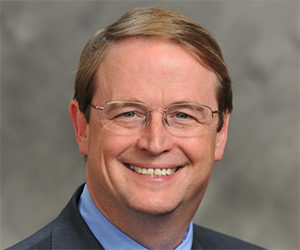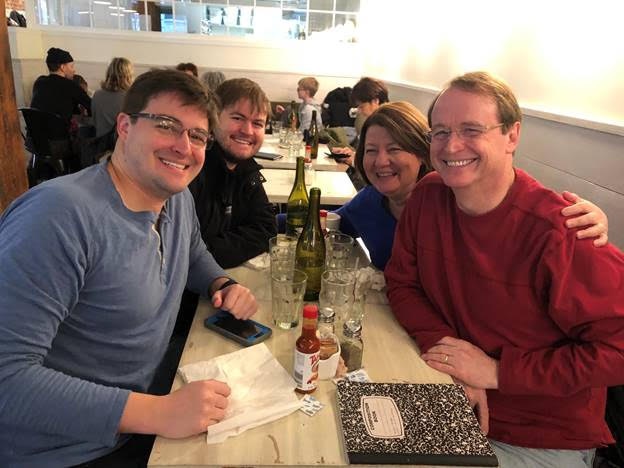 On Saturday morning, I put on my hippest clothes and wished the holes were in different places. Our two adult sons and I took my wife, Carol, to a trendy breakfast spot in a trendy Brooklyn neighborhood for her birthday. I could have ordered seared marinated tofu, but I went with scrambled eggs and toast. As we waited for Carol’s beets with goat cheese and sweet roasted walnuts, we took turns naming things we love about Carol – her intelligence, her infectious laughter, her patience, her editing skills, her reasonable height and her willingness to be the subject of other people’s columns.
On Saturday morning, I put on my hippest clothes and wished the holes were in different places. Our two adult sons and I took my wife, Carol, to a trendy breakfast spot in a trendy Brooklyn neighborhood for her birthday. I could have ordered seared marinated tofu, but I went with scrambled eggs and toast. As we waited for Carol’s beets with goat cheese and sweet roasted walnuts, we took turns naming things we love about Carol – her intelligence, her infectious laughter, her patience, her editing skills, her reasonable height and her willingness to be the subject of other people’s columns.
Then Amy Poehler came in. We are a “Parks and Rec” family. All of us would love to vote for Leslie Knope, the perky, mid-level bureaucrat in the Parks Department of Pawnee, a fictional town in Indiana we would have visited by now if it existed.
Ron Swanson is our favorite libertarian, Ann Perkins our favorite nurse, Andy Dwyer our favorite shoe shiner and Mouse Rat our favorite band. (We are the kind of fans who know that every Mouse Rat song includes one of these two lyrics – “Spread your wings and fly” or “You deserve to be a champion.”)
Our family cried at Li’l Sebastian’s Memorial Service. We imagine how sweet Sweetums must be. Leslie’s hatred of libraries makes us question our love for libraries.
We have lived in New York long enough to know that when we see a celebrity, we do not acknowledge their fame. We do not touch them, talk to them, look them in the eye, ask for autographs, follow them into the bathroom or take a picture. If the celebrity happens to be in a picture the waitress takes of your family that’s just a coincidence. (You can see Amy just to the left of Graham’s head.) When this happy coincidence happens, we do not share it, tweet it or Instagram it. But of course I do write a column about it.

Amy Poehler and Graham, Caleb, Carol and Brett Younger at breakfast
We know stars are just people, so we are as chill as we can be, which is hard when the star is Amy Poehler. What is she eating? Leslie promised to “avoid salad and other disgusting things.” Wouldn’t it be great if she’s eating waffles? Leslie taught us, “We have to remember what’s important in life: friends, waffles and work. Or waffles, friends, work. But work has to come third.”
What if Amy Poehler says something to us, how should we respond? We do not want to say something she has heard a million times. Carol could say, “Ms. Poehler, Leslie was so right. My husband loves it when I show him I’m better than he is at something he loves.” Amy might like it if we said, “We didn’t want to bother you because Leslie taught us ‘One person’s annoying is another person’s inspiring and heroic.’”
After several minutes of working on what we would say if Amy Poehler decided to join us at our table, Carol announced, “Amy Poehler is ruining my birthday!”
“Most of us harbor a secret desire to be famous. We crave the tiny reassurance of attention.”
Carol is right. If we ignore the person at our table in favor of the celebrity two tables away, then we have a problem. A culture that suggests fame is the ultimate measure of success makes us feel bad that we do not look like Ryan Gosling. Plastic surgery seems reasonable. Reality TV passes for reality. Celebrity news looks like real news. If the mostly unknown believe that being mostly known is the goal that matters most, then they are not going to feel good about themselves.
When we become more interested in fame than reality, then we need to put down Us Weekly and pick up The New York Times. We need to be able to name more senators than “Real Housewives.” We need to know more about the co-worker at the next desk than about Ariana Grande.
When celebrities whine about being famous it seems ridiculous that they are complaining about achieving something so many people want, but they have a point. Fame does not usually lead to happiness. Celebrities often feel trapped by their fame.
And yet, most of us harbor a secret desire to be famous. We crave the tiny reassurance of attention. We wait to be discovered. We are disappointed that we are not more celebrated.
Letting go of our desire to be famous could lead to better birthdays. Admiring people who do things worthy of our admiration – hard workers, loving parents, good listeners, caring teachers – could help us understand that anonymity is okay. The happiest person could be a perky, mid-level bureaucrat who enjoys life and a good breakfast.
